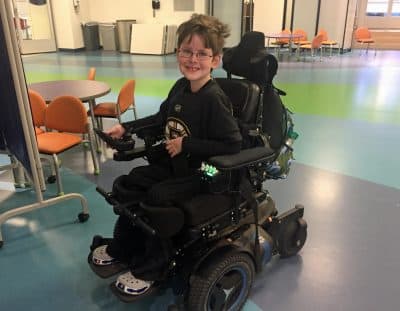Advertisement
Biogen's Push For Newborn Screening Aims To Boost Reach Of Drug For Spinal Muscular Atrophy
The Massachusetts Department of Public Health is preparing a pilot program to screen newborns for a rare but often fatal disease: spinal muscular atrophy, or SMA.
Last month, the Missouri Legislature approved a bill directing health officials to screen newborns statewide for the disorder. If the governor signs the measure, officials say it would be the first SMA screening law of its kind in the country.
It's all good news for Cambridge-based Biogen, maker of the drug Spinraza, the only therapy available to treat SMA. And the company says it's one important step in an overall strategy to initiate newborn screening for SMA across the United States and around the world.
A 'Floppy' Baby
There was no newborn screening when Marina Condon, a nurse in Peabody, gave birth to her daughter Arianna in May 2016. Despite a routine pregnancy and an older daughter with no developmental issues, Condon had a feeling something was wrong when Arianna never tried to squirm out of her swaddling blanket.

"I started questioning myself, why isn't she trying to get out of my swaddles?" Condon says. "My oldest one, I remember she would get out of her swaddles. We used to call her 'Spidey' because she was like a spider getting out of her swaddles. But Arianna never tried."
At nearly 5 months old, Arianna was unable to hold up her head. Her mother grew more concerned and brought it up with the pediatrician. "She was just floppy, floppy, floppy. She should be holding her head but she was just this Jell-o, like a pudding. There was no muscle."
But the doctor told her not to compare her two daughters, and that children develop at different rates.
At nearly 6 months old, baby Arianna was finally sent to a neurologist for testing. The doctor said he suspected SMA, but it would take weeks to confirm the diagnosis.
Condon and her husband endured four sleepless weeks waiting for the test results, all the while Googling SMA and fearing the worst.
Advertisement
Then the results came in on Halloween.
"We were out trick or treating, we got a call from [Boston Children's Hospital's] nurse practitioner, and she said the tests came back and it was positive," Condon recalls.
Arianna was soon given Spinraza, provided by the drug maker Biogen at no cost to the family. Now their insurer covers the medication — although their claim was initially denied. After about six months on the drug, Arianna appears stronger, her mother says. She can move her head side to side and her cry, which was "so weak you couldn't hear it," is now quite loud, Condon says. But the child's future health remains unclear.
'The Pricing Is Something The Market Has Never Seen'
In order to avoid delayed diagnosis like Arianna's and identify newborns with the disease before symptoms even arise, Biogen executives say screening at birth is essential.
"Newborn screening is important for the treatment of SMA now that we have an approved therapy for it because the data that we've generated in our studies have demonstrated that early treatment leads to better outcomes," says Gilmore O’Neill, a neurologist and senior vice president for late-stage clinical development at Biogen.
SMA, an inherited disease, afflicts about 1 in 10,000 babies, according to the nonprofit group Cure SMA. It destroys the motor neurons that control movement. Children with SMA1 — the worst form of the disease, which represents about 60 percent of cases — often die before the age of 2 as their muscles deteriorate to the point that they can no longer breathe on their own or swallow.
Spinraza was approved to treat SMA by the U.S. Food and Drug Administration in December, and by the European Union this month. Clinical trials found the drug helped improve some children's motor function compared to untreated kids, and some children with SMA achieved milestones such as ability to sit, stand or walk when they would otherwise not be able to do so. And "a greater percentage of patients on Spinraza survived compared to untreated patients," the company reports.
The cost of the medication, which is delivered through an injection into the fluid surrounding the spinal cord, is about $750,00 the first year for six doses, and $375,000 each year after that. In April, Biogen reported first quarter sales of Spinraza at $47 million. The current thinking is that children with the disease will have to take Spinraza for the rest of their lives.
Despite some early pushback by insurers, both private and public health plans are currently covering the drug, even with the hefty price tag. As of last month, 80 percent of private health plans were covering Spinraza, along with 72 Medicaid plans in 38 states, according to Biogen.
Bruce Nash, chief physician executive at Blue Cross Blue Shield of Massachusetts, says the decision to cover Spinraza and other expensive medications involves weighing competing factors.
"The issue with Spinraza, and other orphan drugs ... is that the pricing is something the market has never seen," Nash says. "And we, as the payer, have to strike that balance and provide what's medically necessary for our members."
Still, Nash says with each new high-priced drug on the market, larger questions emerge about the overall affordability of health care.
"Society has a challenge to try to understand how to balance the access to these new treatments against simple affordability," he says. "With these drugs the costs just pass straight through to the premium. When people are thinking about why premiums increased over the past year, these are significant contributors, because pharmaceutical costs are becoming the main driver of health care inflation and an ever larger part of total health care spent."
Pushing For Early Testing
Years before Spinraza went on the market, a team at Biogen realized that the drug's success would be linked to the earliest possible diagnosis.
Clinical trial data found that getting SMA kids on Spinraza when their motor neurons are first beginning to struggle to communicate with the brain is far more effective than giving the drug after the motor neurons have died. Plus, the sooner a child gets on the drug, the longer they potentially will live and the more drug they will need.
To identify kids early, Biogen and patient advocate groups began meeting with and lobbying both federal officials and states to support mandatory newborn screening for SMA.
"We are working really hard across state legislatures ... getting the supporting infrastructure and testing necessary to help find these patients as quickly as possible," says O'Neill, the neurologist at Biogen.
Newborn screening is important from both a medical and commercial standpoint, says Dr. Jean-Francois Formela, a partner at Atlas Venture, a Cambridge-based venture firm. He says it's an example of "doing well by doing good."
"I understand potential suspicion from some parties as to why Biogen would want to test those kids earlier and treat them earlier, but the fact of the matter is that's a neurodegenerative disease," Formela says. "It's actually the motor neurons of those kids are dying, and the sooner you're being diagnosed and the sooner you're being treated the more likely you are to conserve as many motor neurons as possible and to have a better outcome.
"Obviously they're going to also do well by doing this," he added. "But one has to give them credit from a scientific and medical standpoint — it's actually the right thing to do."
In addition to SMA screening efforts in the state of Missouri, where parents would be able to opt out of screening, several hospitals in New York are studying the feasibility of newborn screening for SMA.
In Massachusetts, the state Department of Public Health is preparing to launch a voluntary pilot SMA screening program that could begin this fall, officials say.
Anne Marie Comeau, deputy director of the New England Newborn Screening Program and a professor at the University of Massachusetts Medical School, says every parent of a newborn will be asked if they want their child screened for SMA using the same heel prick used for other newborn tests.
"Our plan is to offer SMA newborn screening to the entire birth population of Massachusetts sometime later this fall and evidence will be collected and clinicians will be available to see the babies that need to be seen," Comeau says. "Hopefully the benefit will prove to be as fruitful as all of us hoped and we'll go from there."
A New 'Brass Ring'
Ten-year-old Macarthur Sohl didn't have the benefit of newborn screening or treatment when he was diagnosed with SMA2, a milder form of the disease, at age 1. Back then, his parents were told he might live to early adulthood.
Today, Macarthur is like any other fourth grade boy in many ways: He likes to fly his drone in the front yard of his Natick home, and watch Star Wars movies.

But Macarthur knows there's one big difference. "I have something called SMA which means I can't walk so I use this wheelchair," he says.
Cognitively, Macarthur has no problems, but he has trouble doing anything against gravity: He can't lift his head off the floor or his hands above his ears. Low muscle tone in his diaphragm makes coughing ineffective, so pretty much every respiratory illness is an emergency
He has a one-on-one aide at school who helps him manage the physical aspects of his day, and constant care at home.
Even simple things are confounding: He has struggled taking off the cap of a marker at school, says his mother, Kate Sohl.
Although he's only had four doses of Spinraza, Kate says she's beginning to see some improvement.
"I got an email last week from his teacher, she was super excited to report that he had taken off the marker cover for the first time and put it back on," she says. "It seems small, such a small thing, but for us it's huge. Every little thing we can do to give him independence is enormous."
Sometimes Kate Sohl imagines what it would have been like if Macarthur’s SMA had been diagnosed at birth and treated while he was still an infant. But most of the time, she's just focused on the day to day — and allowing herself glimpses of her son's future potential.
"When people read about this drug they often asked me if I think he'll walk again and the truth is I don't," she says. "To us, we've let go of that being the brass ring. For us the brass ring would be for him to get from his wheelchair to his bed by himself, to be able to go to the bathroom by himself, that small dignity is enormous to us. Will this drug do it? I don't know but that's what we focus on."
This segment aired on June 29, 2017.
